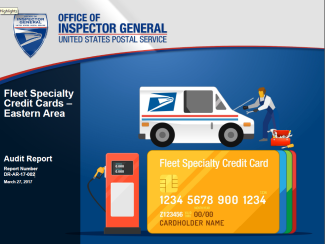Fleet Specialty Credit Cards – Eastern Area
Background
The U.S. Postal Service operates one of the largest vehicle fleets in the U.S. In fiscal year (FY) 2016, the Postal Service used over 227,000 vehicles, primarily to deliver and collect mail. Management assigns every postal-owned vehicle one fleet credit card to pay for commercially purchased fuel, oil, and maintenance expenses of up to $300.
In addition to these cards, the Postal Service has several fleet specialty credit cards, including, most commonly, the Z credit card. This fleet specialty credit card is issued to each facility with assigned vehicles and to Vehicle Maintenance Facilities (VMF) to pay for maintenance or repairs over $300. The Z credit card can also be used to pay for fuel or repairs for vehicles with lost, stolen, or damaged fleet credit cards.
Site managers should monitor all Z credit card purchases to prevent unauthorized charges. They must check for unauthorized transactions and investigate all transactions without receipts to determine whether the purchases were legitimate. Each month, site managers certify that they have reviewed supporting documentation for transactions and will maintain these documents for 2 years.
Site managers must also ensure the VMF that services their vehicles receives a copy of each maintenance invoice or receipt. The VMF enters the maintenance invoice or receipt details into a work order in the Solution Enterprise Asset Management System (SEAM) to maintain complete service records for each vehicle in the fleet.
Additionally, site managers maintain and secure the Z credit cards and the personal identification number (PIN) list. PINs are confidential numbers randomly assigned to Postal Service employees and are used to authorize purchases made with fleet specialty credit cards.
The Eastern Area was selected based on the amount of fleet specialty card purchases in 2016, which totaled $23.9 million. This was one of the top five areas for fleet specialty credit card purchases.
Our objective was to assess the effectiveness of controls over fleet specialty credit cards in the Eastern Area.
What the OIG Found
Controls over fleet specialty credit cards in the Eastern Area were not always effective. We reviewed a statistical sample of 207 transactions for fuel and non-fuel purchases and determined that 86 (42 percent) were not supported by invoices or receipts. Of the 207 transactions we reviewed, 149 were non-fuel transactions, and 103 of those (69 percent) were not included in vehicle maintenance records in SEAM. Further, at 17 of 22 delivery units visited, we found that management did not secure or update PIN lists and some PINs were assigned to merchants. Management also did not properly safeguard fleet specialty credit cards at 13 of 22 delivery units. We made referrals to our Office of Investigations, as appropriate.
These conditions occurred because of inadequate management oversight of the fleet specialty credit card transaction review process and related security requirements. Specifically, management did not ensure fleet specialty credit card transactions and related supporting documentation were reviewed at least monthly, maintained for two years, and provided to the appropriate VMFs as required. Also, management did not ensure that PINs and fleet specialty credit cards were properly managed and secured.
Without management oversight to ensure receipts, invoices, or work orders to support credit card transactions and PINs are properly administered, site managers and VMF managers are unable to determine if charges are appropriate or if vehicle maintenance records are complete. We estimate the Eastern Area incurred $9.9 million in questioned costs for unsupported fleet specialty credit card transactions in FY 2016.
What the OIG Recommended
We recommended management issue a directive instructing site managers to ensure fleet specialty credit card transactions and related supporting documentation are reviewed at least monthly, maintained for two years, and provided to the appropriate VMFs.
We also recommended management direct all site managers to follow fleet specialty credit card guidance to properly manage and secure PINs and fleet specialty credit cards.

